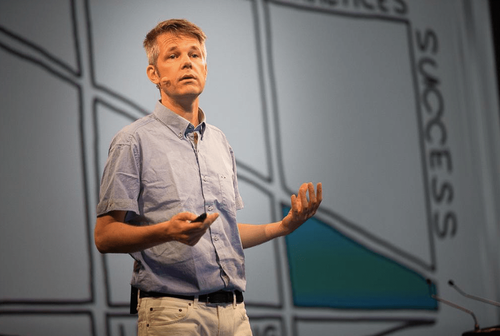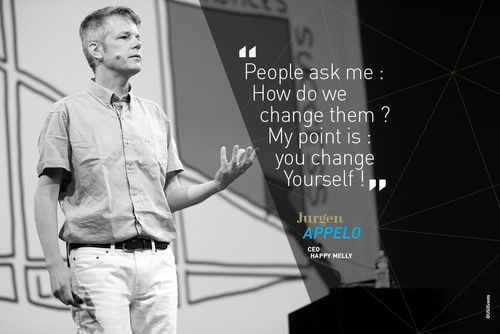Management 3.0: interview with Jurgen Appelo at USI 2015

In addition to his talk at USI, Jurgen Appelo kindly accepted to answer our questions.
OCTO: What would you highlight as new / disruptive with Management 3.0?
Jurgen Appelo: What is new is to manage the system, not the people. For example for our merit money bonus system, I don’t decide who gets how much money, I don’t see that as my job. I think the crowd knows better who has what kind of performance, so I let them make the decision together. What I do is to make sure that this process works as well as possible. That is my responsibility, introducing such an idea. This is the same for many practices traditionally used by managers with higher positions than their employees. I don’t see it as my responsibility to use a carrot and a stick in order to get someone to perform better. My job is to set up things in such a way that people love developing their own performance. OCTO: Who builds the system? Did you or your team propose this bonus system?
Jurgen Appelo: I came up with the idea, and the team said: « It sounds like a great idea, let’s try! ». So I first got buy-in from the team members and then we talked about what worked and didn’t work. In some cases I am the only one who can make the decision, like to decide how much money we can spare or to define the purpose of the company. Many other things are delegated to the people so they work it out with each other.
OCTO: Do you still have one-on-ones with your directs?
Jurgen Appelo: No, we have many opportunities for individual conversations but I don’t have a regular cadence of one-on-one conversations with each of my subordinates. For me it’s a bit old-fashioned.
OCTO: Have you identified a particular profile of companies interested in Management3.0?
Jurgen Appelo: I don’t think there are particular profiles, but I see categories of organizations: - startups who already experiment many things and don’t want to end up with a big bad hierarchy when they grow. They are looking for new, modern management practices and get drowned to these ideas that I borrowed from many different sources - none of these are my own ideas, I just find them around the world. - more traditional organizations who feel that they are falling behind and want to modernize. It is difficult for them because they have to deal with an entire system already in place. But it’s never useless to try! There are examples of traditional companies that made such a transition.
OCTO: Do you have an example of such a traditional company?
Jurgen Appelo: There is company in the Netherlands referred to by Frederic Laloux in his book "Reinventing organizations". They completely transformed themselves. My own experience is with startups, I’m not a coach or consultant so I don’t follow companies in their transitions. But I have read every now and then that companies have been successful with the transition.
OCTO: What do you think managers can primarily expect from Management 3.0?
Jurgen Appelo: First of all: less work! There are many things that you don’t have to do anymore, like performance appraisals. Research shows that they don’t work and you save a lot of time by not doing them anymore. Then, you save on the fewer managers that you need. Plenty of people became managers because it was the only way to make a career. They actually don’t want to be manager but it was the only way to earn more money. They will be happy if you give them alternatives. If you ask me, I started enjoying my job much more and so did my subordinates!
OCTO: Can you profile managers eager to try Management 3.0?
Jurgen Appelo: The kind of people not afraid to try things out. And also to be creative because many managers work inside a bigger environment that demands process that we don’t want anymore. These managers try things within their own scope of control and have to translate it for the outside world still practicing the old way. It often means extra work to make this translation.
OCTO: Have you already seen big traditional companies where a manager experiments with his team and keeps the old way with his own management?
Jurgen Appelo: Yes, years ago, a friend of mine from the U.S. told me that he got bonus money from the CEO who expected him to distribute it among team members. He decided to let them choose how to do and they rapidly came up with the decision to give half to someone and to split the rest between the others. It was amazing! The team was happy to recognize the special contribution of one of them, and nobody was blaming the manager for doing a bad job. But then you have to explain this to the CEO. You need courage to run experiments and make the translation outside your team, to defend your team.
OCTO: What is the main difficulty when you start?
Jurgen Appelo: All of these practices that I share in my book are suggestions, things that you can try but it doesn’t guarantee that they will work for you because every organization is different. Yoga is a good metaphor: you do yoga practices because in principle it's healthy. But not every practice is good for every person and you have to be smart about that or ask a yoga teacher. That is the same with Management 3.0 Workout practices: stuff that work for some other companies, that you can try, see how it works and then adapt. The problem is that many companies say: it won’t work for us without even trying! Sometimes things fail. For example in my team, we are going to change the way we work with OKR (« Objectives / Key Results ») because it doesn’t work. We keep the principle that is behind: people have to define their own target, we don’t do it for them. But we are going to change the way we do that. We share our experiments online so that people can see what we try and they seem to appreciate it.
OCTO: How have your convictions evolved these last few years, what lessons have you learned?
Jurgen Appelo: The things I learned are mainly about new individual practices, but it all fits within the philosophy « Manage the system, not the people ». For example in the past I was part of an Innovation Committee with an Idea box initiative. It failed because the first few ideas posted were evaluated by the committee and rejected. After that, nobody proposed any other idea. I would call that a Management 2.0 practice: well intended but it failed. Now I would say: let other employees rate the ideas! Practices keep emerging, come and go but the principles stay.
OCTO: Do you regularly check the system?
Jurgen Appelo: Yes, we hold a regular retrospective meeting, a sanity check with the whole team every couple of months about what works and what doesn’t. We experiment different ways to run it. But to be honest, we have created a culture where most problems are addressed when they appear. We don’t need to wait for the retrospective to talk about it. But we still think it is a good thing to take this moment.
OCTO: Where to start?
Jurgen Appelo: Start anywhere! Anywhere that makes sense for you. Some areas are easier than others: it’s much easier to discuss « Personal maps » than to start changing the salary and compensation system. It is better to work first on an new organizational culture before changing how people are being paid. As in yoga, some postures are for advanced practitionners. But there is no order between easy practices. Just try something that looks really easy and harmless to you : "Kudo box" or "Personal Maps" are very easy and everyone like them.
Want to know more? Check out Jurgen Appelo's talk "Manage yourself!" at USI!
